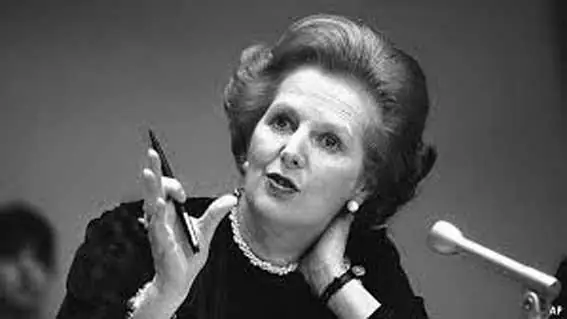
[Order Michael Finch’s new book, A Time to Stand: HERE. Prof. Jason Hill calls it “an aesthetic and political tour de force.”]
Iain Dale begins the introduction to his new book, Thatcher, as follows: “If you’ve read Charles Moore’s magisterial and brilliantly written three-volume account of Margaret Thatcher’s life, I’m tempted to advise you to stop here. This short biography is not for you.”
Well, I’ve read Moore’s book. And it is magisterial and brilliantly written. I didn’t skip a word, with the possible exception of a paragraph here and there about minor details of economic policy. The book was that good. It brought Margaret Thatcher back to life again, and one had the delightful experience of seeing the shopkeeper’s daughter from Grantham advance by stages, by dint of her own intelligence, determination, and hard work, to become the most consequential British prime minister since Churchill and, with Reagan and Pope John Paul II, a key player in the downfall of Soviet Communism.
In short, I’ve read the definitive, authorized biography, one that I can’t imagine being improved upon. But I chose not to put down Dale’s book, because I was curious to see how Thatcher’s story could be told adequately in 180 pages of rather large print. I was also curious about Dale’s take on the Iron Lady. Now 63, he’s been a successful journalist and an unsuccessful Conservative politician, running repeatedly for office without ever winning. He’s written or compiled at least five previous books about Thatcher, in addition to a few dozen other volumes about British politics. Many of the items in his oeuvre look like quickie books – volumes of thumbnail accounts of British monarchs, British prime ministers, and American presidents.
Thatcher is something of a quickie book too, part of a series of short biographies, all of them published by Swift Press, of the likes of Churchill and Harold Wilson and Tony Blair. Now, the very thought of reading even a short biography of Wilson or Blair drives me nearly to tears of boredom. I adore Churchill, but after avidly consuming Andrew Roberts’s comprehensive, splendid biography I’m good. My enthusiasm for Thatcher, however, is so strong that I couldn’t resist the temptation to dive into Dale’s admittedly shallow pool.
Dale’s first few chapters are organized chronologically: Thatcher’s girlhood, her early career, her rise to head of the Conservative Party. Then we get to her premiership and the organization becomes thematic: economic policy, trade unions, Northern Ireland, the Falklands War, foreign relations, Reagan and Gorbachev. Then it’s back to chronology – Thatcher’s downfall, her retirement years – and, finally, a summing-up: her successes and failures, debunking the major myths about her.
It all rushes by so fast. And what’s missing almost entirely is precisely the kind of human material that made Thatcher come so richly, charmingly, and impressively to life in Moore’s three-volume masterwork – all the little telling details, all the illuminating anecdotes, that there’s simply no room for in a book like this. We don’t even get a taste of her famous “The lady’s not for turning” speech. Or a glimpse of her marriage. Or a real feel for her extraordinary relationship with Reagan. It reads like a Cliff’s Notes.
But I’m being unfair. Again, this book isn’t meant for me. As Dale explains at the outset, it’s meant for readers who are too young to have lived through the Thatcher years – people who either know next to nothing about her, or have been brainwashed by the left-wing mainstream media and by pop-culture items like Elton John’s disgusting song about her (“Merry Christmas, Maggie Thatcher / We all celebrate today / ‘Cause it’s one day closer to your death”) from the not-so-sweet musical stage version (2005) of what had been a very sweet movie entitled Billy Elliot (2000).
To this day, Thatcher is demonized by the British left for breaking a coal miner’s strike. Never mind that this was a necessary action, part of a triumphant attempt to end the undemocratic tyranny of trade unions and to rescue Britain from an epidemic of strikes that had cripped the economy, transforming the UK into the “poor man of Europe.” Thatcher turned all that around, bringing economic growth and a spirit of entrepreneurism back to a country from which these things had virtually disappeared.
That not inconsiderable accomplishment has been deep-sixed by the left, which also has insisted that Thatcher’s role in ending Communism is overblown, has accused her of supporting apartheid, and has claimed that she only cared about the rich – a charge to which Dale replies by recalling her decision to sell government-owned “council flats” to the families who lived in them, an action which represented “the single largest transfer of wealth to the working class in generations.”
There are plenty of other ugly myths about the Iron Lady. That’s why Dale’s book exists. Let’s face it, precious few young readers today are ever going to crack open Moore’s three-volume opus. But they might give Dale’s unprepossessing little volume a try. And it’ll tell them some home truths. In a time when the UK is again – as it was before Thatcher’s prime ministership – a broken country, with both the Labour and Conservative parties clinging to destructive left-wing social and economic policies while failing to take serious action on critical challenges (such as, this time around, out-of-control immigration, the crushing of free speech, the weaponization of the police, and the proliferation of Muslim rape gangs), this book may well help some younger voters to see the light.
After all, if it happened in the U.S. – where, thanks largely to the heroic exertions of Charlie Kirk, Donald Trump astonished everyone by winning the youth vote in 2024 – it can happen in Britain, too, where a book like Dale’s can only aid and abet the valiant, and increasingly successful, effort by Tommy Robinson and others to topple the corrupt, complacent, and cowardly Westminster establishment. If there’s a clueless youth in your life – especially one who won’t be put off by the occasional baffling British colloquialism – you could do worse than to give him or her this handy little book.














